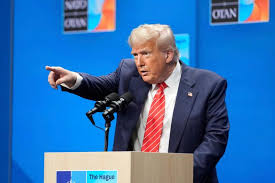Trump repeats claim, says ‘proud’ of stopping India-Pakistan potential ‘nuclear war’

In a bold reiteration of his diplomatic influence, former U.S. President Donald Trump has claimed that his intervention prevented a nuclear conflict between India and Pakistan earlier this year. Speaking at the NATO summit in The Hague on June 25, 2025, Trump declared, “We stopped the nuclear war,” referring to heightened tensions between the two nuclear-armed South Asian neighbors.
While Trump’s statement has drawn both attention and skepticism, it also raises questions about how global leaders shape narratives around diplomacy and crisis resolution. His remarks have sparked a mix of international reactions—ranging from outright denial by Indian officials to strong praise from Pakistani leaders.
A Tense Backdrop: The India-Pakistan Conflict of May 2025
Tensions between India and Pakistan flared in early May after a deadly cross-border skirmish in the Kashmir region. The military exchanges, which resulted in casualties on both sides, rapidly escalated into a full-blown crisis. With both countries possessing nuclear weapons and a history of conflict over the disputed territory, the international community was deeply concerned about a possible war.
By mid-May, the situation had reached a breaking point. Artillery fire, drone strikes, and airspace violations dominated headlines. Civilian evacuations in border towns were underway. Against this backdrop, global powers, including the United States, began diplomatic efforts to de-escalate the situation.
Trump’s Claim: Trade Threats Averted War
According to Trump, his personal intervention was pivotal in stopping the escalation. During his address at the NATO summit, Trump said he warned both New Delhi and Islamabad that any further military action would derail existing and future trade agreements with the United States.
“I told them, ‘If you want trade with the U.S., you don’t start a war.’ And they listened,” he said. “We stopped what could have been the worst nuclear war the world has ever seen. I’m proud of that.”
Trump framed the episode as one of his key foreign policy victories and lamented that he likely wouldn’t receive a Nobel Peace Prize for his efforts—something he has long criticized international institutions for denying him.
India’s Strong Rebuttal
India, however, has offered a very different version of events. According to official sources in New Delhi, the de-escalation occurred due to direct military communication between the two nations’ senior army officials. The ceasefire agreement, finalized on May 10, was reportedly the result of a hotline discussion between the Directors General of Military Operations (DGMOs) of India and Pakistan.
An Indian Ministry of External Affairs spokesperson stated, “There was no involvement of external pressure or trade-related threats. The resolution came from mutual diplomatic and military dialogue.”
Indian officials also downplayed Trump’s role in the process, emphasizing that their decisions were guided solely by national interest and regional stability.
Pakistan’s Response: A Stark Contrast
In contrast, Pakistan has embraced Trump’s narrative. Prime Minister Shehbaz Sharif and Army Chief General Asim Munir praised the former U.S. president’s “timely diplomacy.” In an unexpected move, Pakistan’s government reportedly plans to nominate Trump for the Nobel Peace Prize for his role in resolving the standoff.
General Munir stated during a press conference, “President Trump’s direct engagement with our leadership helped calm the situation. His warning on trade repercussions carried weight.”
This sharp difference in narratives between India and Pakistan reflects the broader complexity of diplomatic efforts in high-stakes conflicts. While both nations have an incentive to protect their national image, their contrasting acknowledgment of external influence reveals how global politics can be subjectively interpreted.
U.S. Diplomacy: A Broader Perspective
Independent reports from international media outlets suggest that the U.S. played a significant but not solitary role in the crisis. Secretary of State Marco Rubio and Vice President J.D. Vance were in regular contact with South Asian diplomats during the May crisis. Their efforts were reportedly coordinated with international allies including the United Kingdom, Saudi Arabia, and the United Nations.
Reuters, for instance, confirmed that while Trump did engage in backchannel discussions, the full diplomatic effort involved a coalition of global stakeholders working behind the scenes to urge restraint on both sides.
Thus, while Trump’s intervention may have played a role—especially in terms of political optics—it was far from the sole factor that led to peace.
Global Reaction: Applause, Criticism, and Skepticism
Trump’s claims have sparked intense global debate. His supporters have hailed him as a decisive leader who can prevent wars through bold, transactional diplomacy. Critics, however, accuse him of exaggerating his influence and using a sensitive geopolitical issue for political gain.
Some analysts believe that Trump’s statement, whether accurate or embellished, reflects his strategy of leveraging U.S. economic power as a foreign policy tool. Others caution that taking credit for peace between nuclear rivals is a delicate matter that requires nuance, not bravado.
Final Thoughts: Who Writes History?
At the heart of this controversy is a familiar question in geopolitics: Who gets to write the narrative of peace? Is it the military officers who negotiated ceasefires on the ground, the diplomats who toiled behind the scenes, or the politicians who claim credit before microphones?
While Trump may never receive the Nobel Prize he believes he deserves, his assertion has already entered the international discourse. Whether history ultimately credits him or not will depend not just on facts, but on which voices dominate the retelling.
In the meantime, one thing is clear: the threat of nuclear conflict in South Asia was real—and the world narrowly avoided catastrophe. The details of who prevented it may remain contested, but the outcome is undeniably fortunate.






